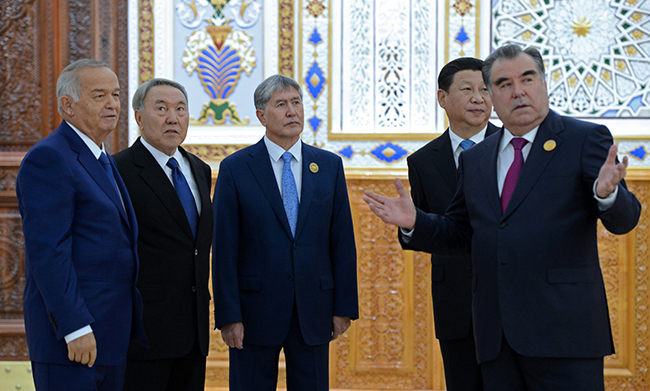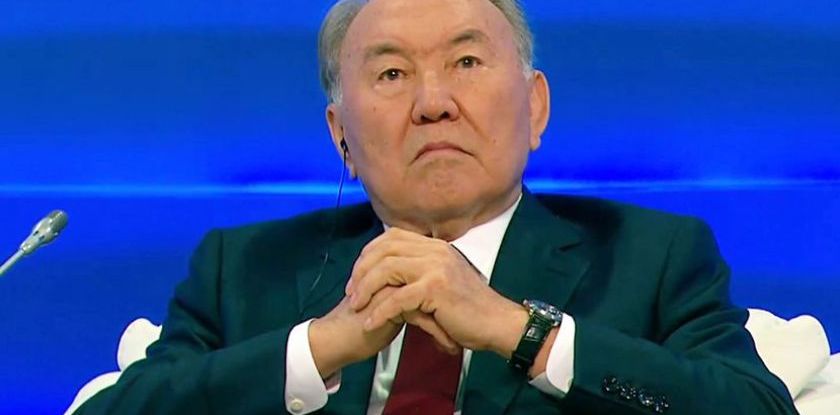The main problem, Nursultan Nazarbaev was faced with in 2003-2005, was that he was to looking at a large-scale crisis within political and economic elite of the country .
…This year the irreplaceable leader of Kazakhstan Nazarbaev is turning 77. In advance of this date, we started publication of his biography “Nursultan Nazarbaev. Stages of career, system of interests and political power”, written in 2005 by a famous Kazakhstani scientist, history PhD, professor Nurbolat Masanov for the activists of civil society that wasn’t published anywhere before.
(Read previous parts: Nursultran Nazarbaev: consolidation of power, Nursultan Nazarbaev: career, interests, power, Nursultan Nazarbaev: ascension to the top , Nursultan Nazarbaev: a focus on ethncoracy, Nursultan Nazarbaev: elimination of opponents and Nazarbaev: consolidation of power.
In some ways this might be a subjective view on the personality of the first president of the countrym but definitely one deserving attention of those interested in the history of Kazakhstan…

Consolidation of elites
In order to critically limit the activity of opposition parties, on June 26, 2002 Nazarbaev proposed to pass 16 amendments to the law “On political parties” to the senate, according to which, a maximum quote of the number of members of political parties would be established at 50 thousand people (instead of 3 thousand) as well as a norm stating that political party loses its official status in case of missing of two parliamentary elections.
All 19 registered political parties at the moment had to go through legal re-registration. By passing these amendments, Nazarbaev was hoping to distance oppositional political parties from the social life of the country (maximum goal) or seriously limit their activity.
For a number of years, several international organizations, including “Reporters without borders” and others when publishing annual reports on the state of freedom of speech in countries of the world, always included president Nursultan Nazarbaev in the list of main enemies of the press and freedom of speech. Having made a reputation as a strangler of the press, and especially after purges against a famous journalist Sergey Duvanov, he understood, that he can’t always be associated in the eyes of world community with the image of an enemy of free of speech. In the summer of 2004 he orchestrated a brilliant spectacle, refusing reactionary laws passed by the parliament, on NGOs and free speech.
Skillfully manipulating his protégés in the parliament, using them for passing various reactionary legislations, Nazarbaev constantly tries to position himself in the eyes of world community as a mature calculated politician, closely looking for parliament not to violate interests of Kazakhstani society, human rights and especially interests of the nascent civil society. But at the same time he isn’t shy to take important, but strict desisons in the economic sphere.
Thus, on june 11 2003 a new, severe conflict has arisen within the elite – between prime minister Imangali Tasmagambetov and the parliament on the issue of the new law “On land”.

President Nazarbaev, through the cabinet of Tasmagambetov and his protégés in the parliament, has pushed through a new law “On land” after which he cynically sent Tasmagambetov and his entire cabinet to resignation – “the Moor has done his duty”.
On june 13 2003, Nazarbaev has appointed D. Ahmetov as the new prime-minister.
If the cabinets of corrupt Sergey Tereshenko, who failed the economy and launched hyperinflation (Oct. 1991- Oct. 1994) and of radical liberal reformer Akejn Kejegeldin (Oct. 1994- Oct. 1997) have only endured three years in power, cabinet of the oil lobbyist Nurlan Balgimbaev almost two years (oct. 1997- Oct. 1999) and cabinet of the docile protégé of Nazarbaev’s family, “push-over” K. Tokaev – alittle over two years 9Oct. 1999 – Jan 2002), the cabinet of the traditionalist with big political ambitions I. Tasmagambetov has endured at power less than others – only a year and a half (Jan. 2002- Jun. 2003). He was replaced for three years now (article is written in 2005) by Daniyal Ahmetov, who heads cabinet of ministers and is the lobbyist of Alexander Mashkevich and the Eurasian group.

The main problem that clearly arises (had risen back then – edit.) before Nazarbaev is that he is faced with an upcoming crisis within political and economic elite of the country.
Until recently, ruling elite of the country was satisfied with Nazarbaev’s thesis that, he as the president of the country is a guarantor of unchangeable nature of political and economic interests of the elites in the country including of foreign investors. But the bigger the financial dividends, the better are perspectives of economic growth and vice versa, the more vague are prospects of political future, the more often are institutional, legislative and political guarantees for preserving of current status quo, are put forth by elite as the main subject.

Until now, Nazarbaev refuses to provide political and economic elite with such guarantees, assuming that if the issue will be transferred to political realm, then he might lose main source of controllability of this elite and its personal dependency on president. If the elite receives legislative, institutional and political guarantees of preservation of its property, privatized resources and gains, then inevitably its independence will increase; and so will the influence of other institutes of power, such as Majilis of the parliament and oblast maslikhats, while the president and his family will lose a considerable volume and resources of power and spheres of influence.
Due to this, political elite and the public opinion in some form always voices an issue of preserving of priorities of naturally-evolutional development path and necessity of gradual, president-guided, modernizing of federal-political system, in order to get rid of another key contradiction between relatively liberal economic system of dispersed private owners and highly-concentrate system of political organization of state power. This contradiction is the main reason for total corruption and ocne in while occurring clots in realization of economic interests.
Nazarbaev, for the time being, brushes aside giving institutional, political and legislative guarantees to the ruling class and the demands on necessity of governmental modernization of the country, hoping to postpone solving of these important issues cold storage. He believes, that concept of “political loyalty in exchange for independence and corruption” proposed by him to political and economic elite and government employees, will be still effective and will neutralize any attempts from the ruling class.
But the established balance of power is very fragile, and any unreasoned act of protest, such as a ban on right-side cars, taking away of land for use of oligarchs and members of family of the president, demolition of multi-apartment buildings for elite residential buildings in Almaty and Astana, can easily provoke a new political conflict. President gradually loses flexibility, ability to solve conflicts and control political processes; society keeps getting out of control and loudly stating their needs.

In his multiple foreign policy initiatives, Nazarbaev at different times held contradicting views. This is why he put forward the concept of multi-vector politics, aimed at situational reaction to emerging challenges. But the main thing is that proposed by the president foreign policy doctrines, on one hand, clearly demonstrate his unbridled ambition (SVMDA, EvrAzES, SCO) and on the other, foreign policy of the country in large part has a purely applied character, dictated either by conjecture of relations with big nations (PIM, anti-terrorist coalition) or is dictated by domestic interests (CIS, OCAC).
As for integrational tendencies, Nazarbaev as a consistent proponent of priority of Kazakhstan’s sovereignty supports primarily either economic projects or or bloc, coalition projects, but in essence isn’t ready to delegate part of national sovereignty to anyone, or any supranational bodies of power. This always causes vexation and discontent among supporters of imperial approach of Russia. These people do not seize their attempts to integrate Kazakhstan into structure of pro-Russian federation.

They believe that lately, integrational tendencies in Nazarbaev’s policy have played a much smaller role. Within CIS he supports only those integrational projects that give Kazakhstan unilateral economic advantages. Politiccal integration in the scope of former USSR forms as a desired only on “the basis of sovereignty, independence, territorial integrity, non-involvement in domestic issues” and is supported only on the condition of equality between Kazakhstan and Russia and non-allowance of Russian hegemony.

At the same time is striving for hegemony of Kazakhstan in central Asia, which is served by his integrational initiatives of regional scope.
Recently (he is talking about the period of 2004-2005 – edit.) president of Kazakhstan Nazarbaev, became an object of constant media attacks both in Russian and in the west. Gradually, an image of a “dictator of a corrupt government, systemically violating human rights” is being formed. At the same time, almost none of the foreign policy initiatives of the Kazakh president are left un-booed by the democratic opposition, leaning on its connections abroad. The same fate awaited statements of Putin, Nazarbaev, Kuchma and Lukashenko on creating of a single economic space, and opening of the “Year of Kazakhstan in Russian Federation” and hosting of international conference of peace” in Alma-Ata.
To be continued




